 37 citations,
January 2004 in “Hormone Research in Paediatrics”
37 citations,
January 2004 in “Hormone Research in Paediatrics” About 3% of high school girls aged 14-18 in Isfahan, Iran, have polycystic ovary syndrome.
 41 citations,
May 2018 in “Nutrition and healthy aging”
41 citations,
May 2018 in “Nutrition and healthy aging” Skin aging is largely due to differences in stiffness and elasticity between skin layers, leading to wrinkles.
 21 citations,
January 2017 in “Skin Pharmacology and Physiology”
21 citations,
January 2017 in “Skin Pharmacology and Physiology” Caffeine-based liquid 0.2% is as effective as minoxidil 5% for treating male hair loss.
 8 citations,
June 2017 in “Hormone Molecular Biology and Clinical Investigation”
8 citations,
June 2017 in “Hormone Molecular Biology and Clinical Investigation” Mild thyroid issues don't affect the metabolism and hormones of women with PCOS.
 1 citations,
April 2017 in “Journal of Investigative Dermatology”
1 citations,
April 2017 in “Journal of Investigative Dermatology” A new one-step test can quickly identify skin cancer during surgery.
 127 citations,
March 2004 in “Gynecologic oncology”
127 citations,
March 2004 in “Gynecologic oncology” Taking selenium supplements during chemotherapy may help reduce side effects and improve health markers in ovarian cancer patients.
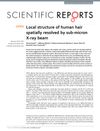 24 citations,
November 2015 in “Scientific reports”
24 citations,
November 2015 in “Scientific reports” Human hair has a new region with ordered filaments and the cuticle contains β-keratin sheets.
 1 citations,
August 2023 in “Clinical, Cosmetic and Investigational Dermatology”
1 citations,
August 2023 in “Clinical, Cosmetic and Investigational Dermatology” A condition with certain scalp changes may come before acne keloidalis nuchae and other similar hair loss disorders.
22 citations,
January 1991 in “Clinical Therapeutics” Oxiconazole nitrate cream is effective and safe for treating various fungal skin infections.
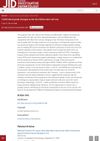 April 2023 in “Journal of Investigative Dermatology”
April 2023 in “Journal of Investigative Dermatology” The study found that aging hair follicle stem cells change behavior, leading to hair loss, but drugs targeting these cells may help restore hair growth.
 April 2017 in “Journal of Investigative Dermatology”
April 2017 in “Journal of Investigative Dermatology” Cholecystokinin may help reduce skin inflammation in psoriasis.
 April 2017 in “Journal of Investigative Dermatology”
April 2017 in “Journal of Investigative Dermatology” HPH-15, a new compound, effectively reduces skin fibrosis in experiments without causing harm.
227 citations,
April 2020 in “Cell” More precise, personalized therapies are needed for autoimmune diseases.
19 citations,
November 2015 in “Radiation Oncology” Hippocampus sparing whole brain radiation therapy prevents hair loss and preserves cognitive function.
 2 citations,
February 2023 in “Journal of The American Academy of Dermatology”
2 citations,
February 2023 in “Journal of The American Academy of Dermatology” Scalp biopsies greatly improved diagnosis and treatment for Black women with unclear alopecia.
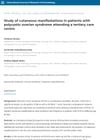 July 2019 in “International Journal of Research in Dermatology”
July 2019 in “International Journal of Research in Dermatology” Women with PCOS often have acne, obesity, and excess hair, especially on the chin and upper lip.
 21 citations,
May 1989 in “Advanced Drug Delivery Reviews”
21 citations,
May 1989 in “Advanced Drug Delivery Reviews” Liposomes show promise in cancer treatment by delivering drugs with less toxicity and improved effectiveness.
 4 citations,
March 2016 in “DOAJ (DOAJ: Directory of Open Access Journals)”
4 citations,
March 2016 in “DOAJ (DOAJ: Directory of Open Access Journals)” Clove oil in emu oil helps condition hair and promote hair growth.
 7 citations,
May 2015 in “General and Comparative Endocrinology”
7 citations,
May 2015 in “General and Comparative Endocrinology” Finasteride negatively affects fish reproduction and gonadal development.
 1 citations,
January 2022 in “Monaldi archives for chest disease”
1 citations,
January 2022 in “Monaldi archives for chest disease” After severe COVID-19, lung damage can improve, detected effectively by lung-ultrasound, and high pressure support during hospitalization can increase lung artery size. Also, about 22% of patients had lung blood clots, and when treated, they recovered faster.
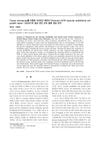 December 2009 in “Saengmyeong gwahag hoeji/Saengmyeong gwahak hoeji”
December 2009 in “Saengmyeong gwahag hoeji/Saengmyeong gwahak hoeji” Thymosin β4 and VEGF are important for blood vessel formation in many organs.
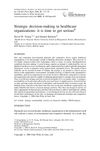 17 citations,
July 2006 in “The International Journal of Health Planning and Management”
17 citations,
July 2006 in “The International Journal of Health Planning and Management” Healthcare organizations must seriously focus on strategic decision-making to succeed in a complex market.
1 citations,
July 2022 in “Clinical, Cosmetic and Investigational Dermatology” Taohong Siwu Decoction may help treat hair loss by targeting multiple genes and pathways.
February 2023 in “Medicine in novel technology and devices” Microneedles with traditional Chinese medicine can help regrow hair in androgenic alopecia.
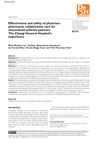 2 citations,
April 2019 in “Proceedings of Singapore Healthcare”
2 citations,
April 2019 in “Proceedings of Singapore Healthcare” Collaborative care between physicians and pharmacists improved medication management for rheumatoid arthritis without raising costs.
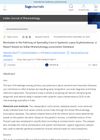 November 2024 in “Indian Journal of Rheumatology”
November 2024 in “Indian Journal of Rheumatology” Educating primary care doctors and improving referrals to rheumatologists can reduce delays in treating lupus patients.
 137 citations,
January 2000 in “Skin Pharmacology and Physiology”
137 citations,
January 2000 in “Skin Pharmacology and Physiology” The document recommends using both clinical evaluation and various measurement methods to assess skin greasiness, considering factors like temperature and hormones.
January 2025 in “Aesthetic Plastic Surgery”  5 citations,
May 2018 in “Drug Safety”
5 citations,
May 2018 in “Drug Safety” Using electronic health records can help identify drug side effects but has some limitations.
 December 2023 in “Journal of the American Academy of Dermatology”
December 2023 in “Journal of the American Academy of Dermatology” Refugee patients face long wait times for dermatology care, worsening health disparities.
























